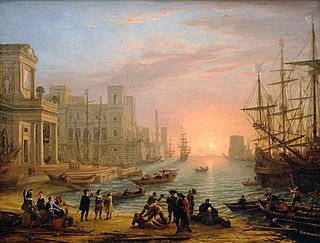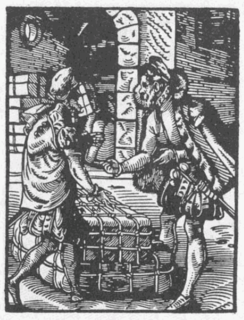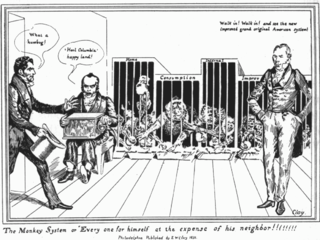
International trade is the exchange of capital, goods, and services across international borders or territories.

Mercantilism is a national economic policy that is designed to maximize the exports of a nation. Mercantilism was dominant in modernized parts of Europe from the 16th to the 18th centuries before falling into decline, although some commentators argue that it is still practiced in the economies of industrializing countries in the form of economic interventionism.

Paraguay has a market economy highly dependent on agriculture products. In recent years, the economy has grown as a result of increased agricultural exports, especially soybeans. Paraguay has the economic advantages of a young population and vast hydroelectric power but has few mineral resources, and political instability has undercut some of the economic advantages present. The government welcomes foreign investment.

Trade involves the transfer of goods or services from one person or entity to another, often in exchange for money. A system or network that allows trade is called a market.
A tariff is a tax on imports or exports between sovereign states. It is a form of regulation of foreign trade. It is a policy that taxes foreign products to encourage or protect domestic industry. The tariff is historically used to protect infant industries and to allow import substitution industrialization.

Free trade is a trade policy that does not restrict imports or exports as well as the idea of the free market as applied to international trade. In government, free trade is predominantly advocated by political parties that hold liberal economic positions while economically left-wing and nationalist political parties generally support protectionism, the opposite of free trade.
This aims to be a complete article list of economics topics:

Import substitution industrialization (ISI) is a trade and economic policy which advocates replacing foreign imports with domestic production. ISI is based on the premise that a country should attempt to reduce its foreign dependency through the local production of industrialized products. The term primarily refers to 20th-century development economics policies, although it has been advocated since the 18th century by economists such as Friedrich List and Alexander Hamilton.

Raúl Prebisch was an Argentine economist known for his contributions to structuralist economics such as the Prebisch–Singer hypothesis, which formed the basis of economic dependency theory. He became the executive director of the Economic Commission for Latin America in 1950. In 1950, he also released the very influential study The Economic Development of Latin America and its Principal Problems.

Trade diversion is an economic term related to international economics in which trade is diverted from a more efficient exporter towards a less efficient one by the formation of a free trade agreement or a customs union. Total cost of good becomes cheaper when trading within the agreement because of the low tariff. This is as compared to trading with countries outside the agreement with lower cost goods but higher tariff. The related term Trade creation is when the formation of a trade agreement between countries decreases of price of the goods for more consumers, and therefore increases overall trade. In this case the more efficient producer with the agreement increases trade.

Development theory is a collection of theories about how desirable change in society is best achieved. Such theories draw on a variety of social science disciplines and approaches. In this article, multiple theories are discussed, as are recent developments with regard to these theories. Depending on which theory that is being looked at, there are different explanations to the process of development and their inequalities

Unequal exchange is a much disputed concept which is used primarily in Marxist economics, but also in ecological economics, to denote forms of exploitation hidden in or underwriting trade. Originating, in the wake of the debate on the Singer-Prebisch thesis, as an explanation of the falling terms of trade for underdeveloped countries, the concept was coined in 1962 by the Greco-French economist Arghiri Emmanuel to denote an exchange taking place where the rate of profit has been internationally equalised, but wage-levels have not. It has since acquired a variety of meanings, often linked to other or older traditions which perhaps then raise claims to priority.
The economic history of Brazil covers various economic events and traces the changes in the Brazilian economy over the course of the history of Brazil. Portugal, which first colonized the area in the 16th century, enforced a colonial pact with Brazil, an imperial mercantile policy, which drove development for the subsequent three centuries. Independence was achieved in 1822. Slavery was fully abolished in 1888. Important structural transformations began in the 1930s, when important steps were taken to change Brazil into a modern, industrialized economy.

The American System was an economic plan that played an important role in American policy during the first half of the 19th century. Rooted in the "American School" ideas of Alexander Hamilton, the plan "consisted of three mutually reinforcing parts: a tariff to protect and promote American industry; a national bank to foster commerce; and federal subsidies for roads, canals, and other 'internal improvements' to develop profitable markets for agriculture". Congressman Henry Clay was the plan's foremost proponent and the first to refer to it as the "American System".
An economy is an area of the production, distribution, or trade, and consumption of goods and services by different agents. Understood in its broadest sense, 'The economy is defined as a social domain that emphasize the practices, discourses, and material expressions associated with the production, use, and management of resources'. Economic agents can be individuals, businesses, organizations, or governments. Economic transactions occur when two parties agree to the value or price of the transacted good or service, commonly expressed in a certain currency. However, monetary transactions only account for a small part of the economic domain.
Trade is a key factor of the economy of China. In the twenty-five years that followed after the Communist takeover in 1949, China's trade institutions developed into a partially modern but somewhat inefficient system. The drive to modernize the economy that began in 1978 required a sharp acceleration in commodity flows and greatly improved efficiency in economic transactions. In the ensuing years economic reforms were adopted by the government to develop a socialist market economy. This type of economy combined central planning with market mechanisms. The changes resulted in the decentralization and expansion of domestic and foreign trade institutions, as well as a greatly enlarged role for free markets in the distribution of goods, and a prominent role for foreign trade and investment in economic development.
The Commercial Import Program, sometimes known as the Commodity Import Program (CIP), was an economic aid arrangement between South Vietnam and its main supporter, the United States. It lasted from January 1955 until the Fall of Saigon in 1975 and the dissolution of South Vietnam following the invasion by North Vietnam after US forces had withdrawn from the country due to the 1973 cease-fire agreement. The initiative was a trading plan that was designed to inject large amounts of American capital into the South Vietnamese economy to help fuel its industrialisation, growth and self-sufficiency, without incurring the high levels of inflation that would normally occur in such a drastic injection of money.
The Cuban sugar economy is the principal agricultural economy in Cuba. Historically, the Cuban economy relied heavily on sugar exports, but sugar production has declined since the breakup of the Soviet Union in 1991. In 2015, raw sugar accounted for $378 million of Cuba's $1.4 billion exports.

Mercosur, or Mercosul, officially Southern Common Market is a South American trade bloc established by the Treaty of Asunción in 1991 and Protocol of Ouro Preto in 1994. Its full members are Argentina, Brazil, Paraguay and Uruguay. Venezuela is a full member but has been suspended since December 1, 2016. Associate countries are Bolivia, Chile, Colombia, Ecuador, Guyana, Peru and Suriname. Observer countries are New Zealand and Mexico.










